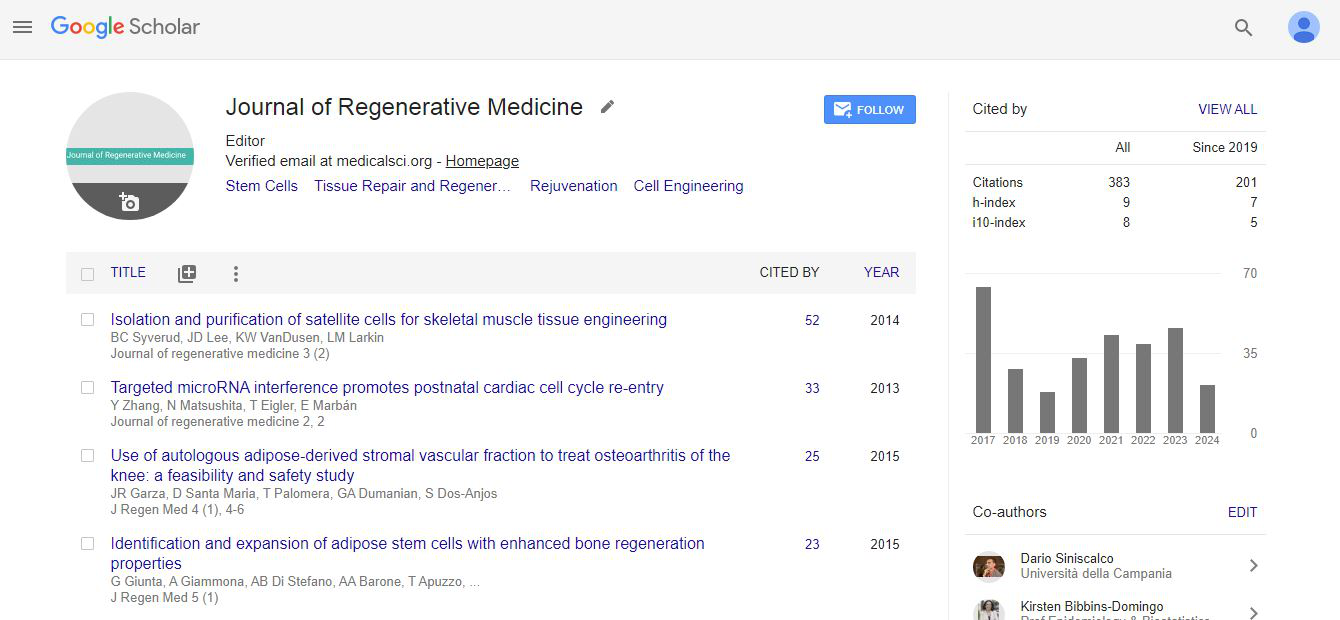Review Article, J Regen Med Vol: 5 Issue: 1
Stem Cell Biology and its Role in Regenerative Medicine: A Concept Shaping the Future of Medicine
| Melkamu Bezie1*, Yonatan Mesfin1 and Habtamu Biyazen2 | |
| 1Faculty of Veterinary Medicine, University of Gondar, P.O. Box 196, Gondar,Ethiopia | |
| 2College of Agro-Industry and Land Resource, Haramaya University, P.O. Box 226, Chiro, Ethiopia | |
| Corresponding author : Melkamu Bezie Faculty of Veterinary Medicine, University of Gondar, P.O. Box 196, Gondar, Ethiopia Tel: +251921068356 E-mail: mbeziethevet@gmail.com |
|
| Received: September 12, 2015 Accepted: February 03, 2016 Published: February 10, 2016 | |
| Citation: Bezie M, Mesfin Y, Biyazen H (2016) Stem Cell Biology and its Role in Regenerative Medicine: A Concept Shaping the Future of Medicine. J Regen Med 5:1.. doi:10.4172/2325-9620.1000126 |
Abstract
Stem cells are special type of cells that have unique capacity to renew themselves and differentiate to give rise to specialized cell types for many tissues. Hence, they are the principal cells of all cell types. Stem cells can be embryonic, fetal, and adult or somatic types. Cells can be reprogrammed artificially through the introduction of endogenous transcription factors by using viruses like retrovirus to produce iPSCs (induced pluripotent stem cells). There are proteins that are important in the regulation of stem cell differentiation such as bone morphogenic protein -2 (BMP-2), leukocyte inhibitory factor and micro RNAs. Cutting edge research featuring stem cells will gear us to medical discovery of cell-based therapies of various diseases occurring in animals and human beings. Apart from applications of stem cells there is a widespread controversy over the use of embryonic stem cells. The controversy targets the techniques used to derive new embryonic stem cell lines which damage the blastocyst. However, reprogramming of adult cells into iPSCs holds great promise for regenerative medicine. Advancement in stem cell research is ever growing and now a day it is gaining a concern and this is a promising indication that adult and embryonic stem cells will be used in the future to treat cancer, paralysis, cardiac failure, stroke, diabetes and many other diseases. In this paper we reviewed the properties and classification of stem cells, regulatory factors of stem cell pluripotency and differentiation, reprograming and potential clinical applications of stem cells, as well as ethical issues in stem cell therapy.
 Spanish
Spanish  Chinese
Chinese  Russian
Russian  German
German  French
French  Japanese
Japanese  Portuguese
Portuguese  Hindi
Hindi 